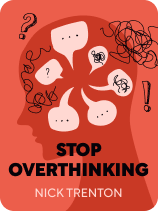

This article is an excerpt from the Shortform book guide to "Stop Overthinking" by Nick Trenton. Shortform has the world's best summaries and analyses of books you should be reading.
Like this article? Sign up for a free trial here.
Are you worried that you’ll never get things done? How do you manage time effectively?
Time management is one of the most effective tools to help you prevent stressing and overthinking. In Stop Overthinking, Nick Trenton identifies three ways you can make time for yourself and other priorities.
Keep reading to learn how to manage time effectively with Trenton’s suggestions.
Manage Your Time to Prevent Stress
Trenton explains that uncertainty can make you feel anxious. When you don’t have a plan for how to complete your daily or weekly tasks, you’re bound to feel higher levels of stress. He suggests you can learn how to manage time effectively by identifying your top priorities, setting SMART goals, and being deliberate about how you spend your time.
Identify Top Priorities
Trenton argues that when you’re consciously aware of what you value in life, you can more easily let go of commitments that don’t fulfill you and instead make time for your priorities, which will reduce your stress. For example, you might determine that you value developing your small business plan, improving your health, and spending time with your kids. When you’re consciously aware of these priorities, it will be easier for you to reduce the time spent on other tasks.
(Shortform note: In The Happiness Project, Gretchen Rubin elaborates that many people’s ideas of fun are based on other people’s perception of fun rather than on what they actually enjoy. When identifying your priorities, Rubin suggests you reflect on whether your current activities are truly enjoyable to you by thinking back to what you enjoyed doing as a child and pursuing more of those activities. This method of finding what you truly enjoy can help identify meaningful hobbies or even life aspirations.)
Set SMART Goals
Eliminate the stress of meeting vague goals by creating ones that are SMART: specific, measurable, achievable, relevant, and time-based. For example, if your goal is to start a side business selling pet portraits, your expression of your SMART goal could be: “I want to sell ten pet portraits in the next month by spending two hours a day painting (specific, measurable, and time-based). I have the necessary supplies, painting experience, and interested followers (attainable), and this goal will help me improve my art skills and finances (relevant).”
When your goals are clear and focused, you’ll know exactly how to accomplish them and eliminate distractions.
(Shortform note: Others acknowledge that setting SMART goals can help you express your goals but caution that they can also cause you to set goals that are too low. They explain that people can get so focused on making a goal attainable that they limit themselves, and they argue that difficult goals are key to high performance. When using the SMART goals formula, double-check to make sure that your goal still stretches your limits and encourages high effort.)
Be Deliberate About How You Spend Your Time
Trenton also advises that you remove the stress of uncertainty by making deliberate choices about when you will accomplish each task. When you make these decisions up front, you’ll know exactly how to spend your time, leaving you less room to overthink.
(Shortform note: Other experts corroborate Trenton’s emphasis on taking control of your time, adding that you should take control of other aspects of your life, too. According to Charles Duhigg in Smarter, Faster, Better, the more in control you feel, the more motivated you become to tackle challenges and pursue your goals. He suggests making more deliberate choices to generate a sense of control because this makes you feel more confident, which in turn boosts your motivation. A deliberate choice could be as small as deciding what you’ll eat for lunch ahead of time.)
To be deliberate in managing your time, Trenton suggests you do two things: 1) sort your tasks into categories of importance and urgency and 2) schedule your time around your priorities.
1) For each new task, first determine if it’s important or urgent. Important tasks move you toward your goals, whereas urgent ones have consequences for not completing them promptly. Then, address important and urgent tasks immediately, schedule important but not urgent tasks for another time, and delegate tasks that are urgent but not important. Finally, discard tasks that are neither so that you can focus on your priorities.
(Shortform note: When determining how to best schedule your time in the future, it can be helpful to understand how you currently spend your time. In Hyperfocus, Chris Bailey suggests you create an attention management matrix to get a clear picture of what kind of tasks you spend your time doing. He recommends you sort your tasks into four categories: unnecessary, distracting, necessary, or meaningful. Bailey points out that people often spend the most time on unnecessary or distracting tasks, which means they perform tasks that capture their attention but aren’t necessarily important.)
2) Block out specific chunks of time for each task throughout your day. Figure out when you’re most productive and plan to do your most important or difficult tasks then. Afterward, fill in the rest of your day with lower-priority work. This method prevents the urge to multitask and allows you to engage in more focused deep work.
(Shortform note: In Deep Work, Cal Newport agrees with Trenton on the importance of devoting time to important or difficult tasks—allowing you to engage in what he calls “deep work.” Newport differentiates deep work from shallow work, which are tasks that don’t require much thinking yet feel like they’re productive. On the other hand, deep work is important, difficult, and fulfilling. He states that distractions such as open floor plans and easy access to technologies make it hard to engage in deep work. In addition to Trenton’s suggestion of scheduling time for deep work, Newport recommends you have a designated workspace where you only perform deep work.)

———End of Preview———
Like what you just read? Read the rest of the world's best book summary and analysis of Nick Trenton's "Stop Overthinking" at Shortform.
Here's what you'll find in our full Stop Overthinking summary:
- What overthinking is and how it’s connected to stress and anxiety
- Ways you can manage stress before, during, and after it happens
- How to conquer your habit of overthinking with long-term solutions






